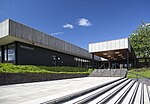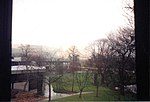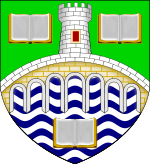Bridge of Allan

Bridge of Allan (Scots: Brig Allan, Scottish Gaelic: Drochaid Ailein), also known colloquially as Bofa, is a town in the Stirling council area in Scotland, just north of the city of Stirling. Overlooked by the National Wallace Monument, it lies on the Allan Water, a northern tributary of the River Forth, built largely on the well-wooded slopes of the Westerton and Airthrey estates, sheltered by the Ochil Hills from the north and east winds. Most of the town is to the east of the river; the bridge is part of the A9, Scotland's longest road, while the railway line and the M9 pass to the west of the river. Bridge of Allan railway station is on the electrified Edinburgh to Dunblane Line and is accessible by train from Stirling in under 5 minutes as well as London in under six hours.
Excerpt from the Wikipedia article Bridge of Allan (License: CC BY-SA 3.0, Authors, Images).Bridge of Allan
Kenilworth Road,
Geographical coordinates (GPS) Address Nearby Places Show on map
Geographical coordinates (GPS)
| Latitude | Longitude |
|---|---|
| N 56.155 ° | E -3.942 ° |
Address
Kenilworth Road
Kenilworth Road
FK9 4RJ , Upper Town
Scotland, United Kingdom
Open on Google Maps








